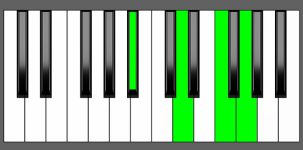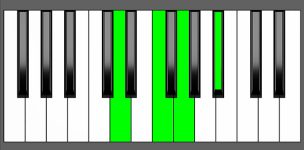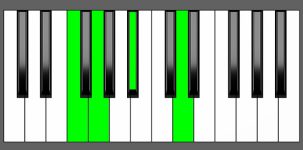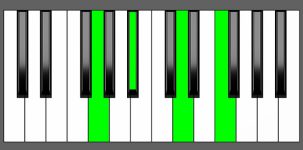Piano Diagram of Bb6 in Root Position
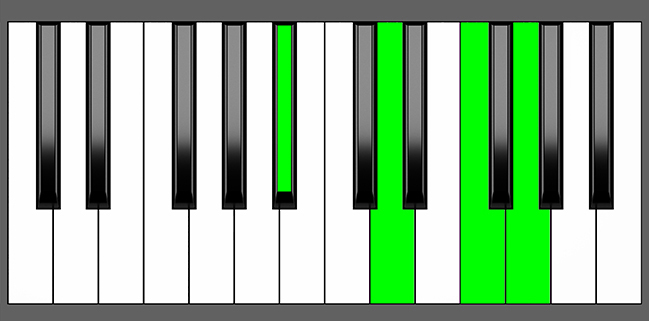
Bb6 is a four-note chord consisting of the notes Bb, D, F, and G. It is a major chord with an added sixth. It belongs to the chord family of “added tone chords” (aka “add chord”). Keep reading to gain a deeper understanding of the music theory behind this chord.
Structure of Bb6
Notes |
|---|
| Bb, D, F, G |
Intervals |
|---|
| R, 3, 5, 6 |
Finger Position
Left Hand |
|---|
| 5, 3, 2, 1
5, 4, 2, 1 |
Right Hand |
|---|
| 1, 2, 4, 5
1, 2, 3, 4 |
Bb6 Chord Inversions
The Bb6 chord has a total of 3 inversions:
| Root Position: | Bb | D | F | G |
| 1st Inversion: | D | F | G | Bb |
| 2nd Inversion: | F | G | Bb | D |
| 3rd Inversion: | G | Bb | D | F |
Piano Keyboard Diagrams
Music Theory and Harmony of Bb6
Building the Bb6 Chord: Different Approaches
Starting from the Bb Major Scale
To create a 6th chord, you can use the Major scale as a reference by combining a Root, a 3rd, a 5th, and a 6th.


Apply the formula R, 3, 5, 6 to build a 6th chord:
- Select the Root note, which is Bb.
- Pick the 3rd note, which is D, and add it to the chord.
- Add the 5th note, which is F, and include it as well.
- Finally, add the 6th which is G
by Combining Intervals
To build a 6th chord, one approach is to combine specific intervals, namely a major 3rd, a minor 3rd, and a major 2nd (a whole-tone).
3 + m3 + 2 = 6th chords
For instance, when building a Bb6 chord, you can observe that
- Bb-D forms a major 3rd interval,
- D-F creates a minor 3rd interval, and
- F-G makes up a whole-tone interval.
By stacking these intervals together, you can form a Bb6 chord.
6th Chords Equivalencies
If we take the third inversion of a 6th chord (which means we move the notes around so that the 6th note becomes the Root note), we end up with a new chord that is equivalent to a min7 chord.
So, if we take the Bb6 chord (which has the notes Bb, D, F, and G) and move the notes around so that G becomes the Root note, we end up with a new chord that is equivalent to a Gmin7 chord (which has the notes G, Bb, D, and F).
3rd inversion of Bb6 = G min7
How to Use Bb6 in a Chord Progression
Since 6th are based on major triads with an extra sixth, they can substitute the major chords built on the scale of the root. This means that we can use the Bb6 chord in those positions on the scale where the harmonization results in a major chord.
This table showcases the harmonized major and natural minor scales where a Bb Major chord can be found. In all positions where a Bb Maj7 chord is present, the Bb6 chord can be used as a variation.
on Major Scales
| Major Scales | I | ii | iii | IV | V | vi | vii |
|---|---|---|---|---|---|---|---|
| Bb | Bb Maj7 ⇒ Bb6 | C min7 | D min7 | Eb Maj7 | F7 | G min7 | Am7b5 |
| F | F Maj7 | G min7 | A min7 | Bb Maj7 ⇒ Bb6 | C7 | D min7 | Em7b5 |
- Tonic chord in Bb Major
- Subdominant chord in F Major
on Natural minor Scales
| Minor Scales | i | ii | III | iv | v | VI | VII |
|---|---|---|---|---|---|---|---|
| G | G min7 | Am7b5 | Bb Maj7 ⇒ Bb6 | C min7 | D min7 | Eb Maj7 | F7 |
| D | D min7 | Em7b5 | F Maj7 | G min7 | A min7 | Bb Maj7 ⇒ Bb6 | C7 |
- Mediant chord in G minor
- Submediant chord in D minor
Bb6 in Bb Major
The 6th interval is a consonant interval, which means it doesn’t create any tension that needs to be resolved. It’s stable and often used as a substitute for the tonic chord, which is usually the main chord in a musical piece.
The A6th chord can be used instead of a Bb major (or Bb major 7th chord), which is the first chord in the harmonized Bb major scale.
In a major key, the I chord (built on the first degree of the major scale) serves as the tonic chord, providing the harmonic center of the chord progression.
| I | ii | iii | IV | V | vi | vii |
| Bb Maj7 ⇒ Bb6 | C min7 | D min7 | Eb Maj7 | F7 | G min7 | Am7b5 |
Bb6 Chord Progressions as I degree
Replacing a standard major chord with a 6th chord can enhance the richness and complexity of your music. Here’s a chord progression that demonstrates how the Bb6 chord can function as a substitute for the tonic (I degree) in a chord progression:
II V I
| ii | V | I |
| C min7 | F7 | Bb6 |
I IV V
| I | IV | V |
| Bb6 | Eb Maj7 | F7 |
I V vi IV
| I | V | vi | IV |
| Bb6 | F7 | G min7 | Eb Maj7 |
I IV vi V
| I | IV | vi | V |
| Bb6 | Eb Maj7 | G min7 | F7 |
Bb6 in F Major
The Bb6 chord can also be used as the fourth degree of the F major scale as a substitute for the Bb Maj7. When applied to the I-IV-V progression, this chord on the fourth degree acts as a transitional chord between the first and fifth degrees.
| I | ii | iii | IV | V | vi | vii |
| F Maj7 | G min7 | A min7 | Bb Maj7 ⇒ Bb6 | C7 | D min7 | Em7b5 |
Bb6 as IV degree – Chord Progressions
Try playing these chord progressions to get an idea of how Bb6 functions as a substitute for the subdominant (IV degree) in a chord progression.
I IV V
| I | IV | V |
| F Maj7 | Bb6 | C7 |
I V vi IV
| I | V | vi | IV |
| F Maj7 | C7 | D min7 | Bb6 |
I IV vi V
| I | IV | vi | V |
| F Maj7 | Bb6 | D min7 | C7 |
Bb6 in G minor
Similarly, in G minor, the Bb6 chord can be used as a substitute for the Bb Maj7 chord on the third degree.
| i | ii | III | iv | v | VI | VII |
| G min7 | Am7b5 | Bb Maj7 ⇒ Bb6 | C min7 | D min7 | Eb Maj7 | F7 |
Bb6 as III degree – Chord Progressions
These chord progressions show the Bb6 chord as a substitute for the mediant (III degree) chord.
i III
| i | III |
| G min7 | Bb6 |
i III VII VI
| i | III | VII | VI |
| G min7 | Bb6 | F7 | Eb Maj7 |
Circle Progression
| i | vi | VII | III | VI | ii | V | i |
| G min7 | C min7 | F7 | Bb6 | Eb Maj7 | A dim7 | D7 | G min7 |
Bb6 in D minor
In the key of D, you can also substitute a Bb6 chord for a Bb Maj7 chord when the Bb Maj7 chord appears on the sixth degree of the D minor scale. This is another situation where the Bb6 chord can be used as a replacement.
| i | ii | III | iv | v | VI | VII |
| D min7 | Em7b5 | F Maj7 | G min7 | A min7 | Bb Maj7 ⇒ Bb6 | C7 |
Bb6 as VI degree – Chord Progressions
You may want to experiment with these chord progressions to understand how the Bb6 chord can be used instead of the Bb Maj7 chord when it acts as the submediant (VI degree) in a D minor scale.
i VI VII
| i | VI | VII |
| D min7 | Bb6 | C7 |
i v VI VII
| i | v | VI | VII |
| D min7 | A min7 | Bb6 | C7 |
i III VII VI
| i | III | VII | VI |
| D min7 | F Maj7 | C7 | Bb6 |
Circle Progression
| i | vi | VII | III | VI | ii | V | i |
| D min7 | G min7 | C7 | F Maj7 | Bb6 | Em7b5 | A7 | D min7 |
Alternative Names for Bb6 Chord
- Sib6
- Bb 6th
- Bb M6
- Bb sixth
- Bb add6
- Bb Maj6
- Bb major6
- Bb major 6th
- Bb major sixth
- Bb major add 6th
